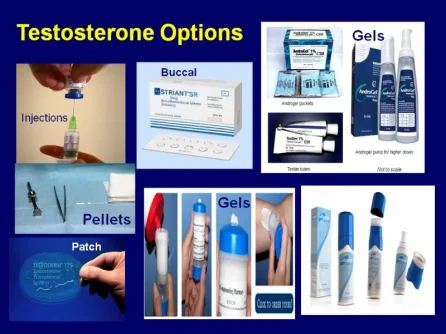Dave Barry
Member
The following link provides an extensive rebuttal to the media reports associating testosterone treatment with greater heart attack risk.
Here is a summary of the study as seen through the eyes of the Cleveland Clinic: http://health.clevelandclinic.org/2013/11/concerns-raised-about-testosterone-therapy/
Here is a summary of the rebuttal from the Life Extension Clinic.
Here is the summary:
"1) In order to protect against heart disease, total testosterone blood levels need to be raised higher than 500–550 ng/dL. Life Extension believes that optimal youthful total testosterone is in the 700–900 ng/dL range.
The men enrolled in this flawed study only boosted their mean total testosterone levels to 332 ng/dL. Previous studies show this low testosterone level (332 ng/dL) is associated with an increased heart attack risk compared with levels above 500–550 ng/dL.
2) The men in this study were not properly individually dosed and monitored, which explains why the testosterone treatment they received failed to restore their blood testosterone levels to anywhere near cardio-protective ranges.
3) Estradiol (an estrogen) blood levels were not reported in this study used to discredit testosterone drugs. A subset of aging men, often with increased visceral body fat (body fat around the internal organs of the abdominal cavity), have a tendency to convert testosterone into excess estrogen. This excess estrogen may alter the balance of anticoagulant and procoagulant (clotting) factors in the blood, and potentially enhance the risk of heart attack and stroke. Any man treated with testosterone drugs should also have his estradiol blood level tested to ensure that the testosterone is not excessively converting to estrogen. If estradiol increases excessively, then low-dose aromatase-inhibiting drugs (such as 1 mg/week of anastrozole [Arimidex[SUP]®[/SUP]]) can be prescribed to reduce the conversion of testosterone to estrogen.
A subgroup of overweight men with excess visceral body fat treated with testosterone in this study would be expected to excessively convert (aromatize) their testosterone into estrogen, which may help explain why more men in the testosterone group suffered a greater percentage of heart attacks.
Research published in 2013 shows profound cardiovascular benefits in response to higher testosterone levels (in men). The media conveniently ignored these positive reports and narrowly focused on the egregiously flawed study published in the Journal of the American Medical Association (JAMA).
Based on many published studies, Life Extension has recommended for decades that aging men restore testosterone to a youthful range. We've always warned that for some men restoring one's testosterone to more youthful levels could create excessive levels of estrogen, which is readily detectable by blood testing and reversible using aromatase-inhibiting therapies.
What's most frightening is that most mainstream doctors today are blindly prescribing testosterone drugs and omitting any kind of estrogen testing. This creates a very dangerous environment for men who excessively convert their testosterone into excess estrogen!"
Full rebuttal below:
http://www.lef.org/featured-article...08&utm_content=text_link&utm_campaign=INL303E
Here is a summary of the study as seen through the eyes of the Cleveland Clinic: http://health.clevelandclinic.org/2013/11/concerns-raised-about-testosterone-therapy/
Here is a summary of the rebuttal from the Life Extension Clinic.
Here is the summary:
"1) In order to protect against heart disease, total testosterone blood levels need to be raised higher than 500–550 ng/dL. Life Extension believes that optimal youthful total testosterone is in the 700–900 ng/dL range.
The men enrolled in this flawed study only boosted their mean total testosterone levels to 332 ng/dL. Previous studies show this low testosterone level (332 ng/dL) is associated with an increased heart attack risk compared with levels above 500–550 ng/dL.
2) The men in this study were not properly individually dosed and monitored, which explains why the testosterone treatment they received failed to restore their blood testosterone levels to anywhere near cardio-protective ranges.
3) Estradiol (an estrogen) blood levels were not reported in this study used to discredit testosterone drugs. A subset of aging men, often with increased visceral body fat (body fat around the internal organs of the abdominal cavity), have a tendency to convert testosterone into excess estrogen. This excess estrogen may alter the balance of anticoagulant and procoagulant (clotting) factors in the blood, and potentially enhance the risk of heart attack and stroke. Any man treated with testosterone drugs should also have his estradiol blood level tested to ensure that the testosterone is not excessively converting to estrogen. If estradiol increases excessively, then low-dose aromatase-inhibiting drugs (such as 1 mg/week of anastrozole [Arimidex[SUP]®[/SUP]]) can be prescribed to reduce the conversion of testosterone to estrogen.
A subgroup of overweight men with excess visceral body fat treated with testosterone in this study would be expected to excessively convert (aromatize) their testosterone into estrogen, which may help explain why more men in the testosterone group suffered a greater percentage of heart attacks.
Research published in 2013 shows profound cardiovascular benefits in response to higher testosterone levels (in men). The media conveniently ignored these positive reports and narrowly focused on the egregiously flawed study published in the Journal of the American Medical Association (JAMA).
Based on many published studies, Life Extension has recommended for decades that aging men restore testosterone to a youthful range. We've always warned that for some men restoring one's testosterone to more youthful levels could create excessive levels of estrogen, which is readily detectable by blood testing and reversible using aromatase-inhibiting therapies.
What's most frightening is that most mainstream doctors today are blindly prescribing testosterone drugs and omitting any kind of estrogen testing. This creates a very dangerous environment for men who excessively convert their testosterone into excess estrogen!"
Full rebuttal below:
http://www.lef.org/featured-article...08&utm_content=text_link&utm_campaign=INL303E
Last edited:














